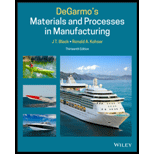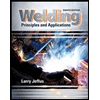
Degarmo's Materials And Processes In Manufacturing
13th Edition
ISBN: 9781119492825
Author: Black, J. Temple, Kohser, Ronald A., Author.
Publisher: Wiley,
expand_more
expand_more
format_list_bulleted
Concept explainers
Textbook Question
Chapter 35, Problem 4RQ
What conditions are required to produce an ideal metallurgical bond?
Expert Solution & Answer
Want to see the full answer?
Check out a sample textbook solution
Students have asked these similar questions
Access Pearson
Mastering Engineering
Back to my courses
Course Home
Course Home
Scores
Access Pearson
Mastering Engineering
Back to my courses
Course Home
Course Home
Scores
■Review
Next >
10. Please see attached pic.
Chapter 35 Solutions
Degarmo's Materials And Processes In Manufacturing
Ch. 35 - What types of design features favor manufacture as...Ch. 35 - What types of manufacturing processes fall under...Ch. 35 - Define welding.Ch. 35 - What conditions are required to produce an ideal...Ch. 35 - What are some of the ways in which welding...Ch. 35 - What are some possible problems associated with...Ch. 35 - What are the three primary aspects required to...Ch. 35 - How are welding processes identified by the...Ch. 35 - What is thermal cutting?Ch. 35 - What are some of the common types of weld defects?
Ch. 35 - What are the four basic types of fusion welds?Ch. 35 - What are some of the common edge configurations...Ch. 35 - What is the role of an insert in welding?Ch. 35 - What types of weld joints commonly employ fillet...Ch. 35 - What are the five basic joint tvpes for fusion...Ch. 35 - What are some of the factors that influence the...Ch. 35 - Why is it important to consider welded products as...Ch. 35 - How does the fracture resistance and temperature...Ch. 35 - How might excessive rigidity actually be a...Ch. 35 - What is autogenous welding?Ch. 35 - In what way is the weld-pool segment of a fusion...Ch. 35 - Why is it possible for the fusion zone to have a...Ch. 35 - Why is it not uncommon for the selected filler...Ch. 35 - What are some of the defects or problems that can...Ch. 35 - Why can the material properties vary widely within...Ch. 35 - What are some of the structure and property...Ch. 35 - Why do most welding failures occur in the...Ch. 35 - Discuss the various regions within the...Ch. 35 - What are some of the characteristics and...Ch. 35 - What process features can increase the size of the...Ch. 35 - What are some of the difficulties or limitations...Ch. 35 - What is the purpose of pre- and postheating in...Ch. 35 - What heat-related metallurgical effects can...Ch. 35 - What causes weld-induced residual stresses?Ch. 35 - What is the cause of reaction-type residual...Ch. 35 - How are reaction stresses affected by the distance...Ch. 35 - What are some of the techniques that can reduce...Ch. 35 - How can the surfaces of weldments be put into...Ch. 35 - In what ways might welding create geometric...Ch. 35 - 40. Why might a welded structure warp if the...Ch. 35 - Why might a stress relief heat treatment be...Ch. 35 - What are some of the techniques that can be...Ch. 35 - Why are the terms weldability and joinability...Ch. 35 - Prob. 1PCh. 35 - Two pieces of AISI 1025 steel are being...Ch. 35 - Figure 35.A schematically depicts the design of a...Ch. 35 - Investigate and summarize some of the important...Ch. 35 - What do you foresee as the major difficulties when...
Knowledge Booster
Learn more about
Need a deep-dive on the concept behind this application? Look no further. Learn more about this topic, mechanical-engineering and related others by exploring similar questions and additional content below.Similar questions
- Can you answer this question?arrow_forwardCan you answer this question?arrow_forwardA gear has a gear wheel with 16 teeth. The gear should be dimensioned for the highest and lowest gear ratio. Looking for output power, torque, speed?nin= 2000 rpmmin = 30Nmn=0,9a max= 450 mmModule 4Gear limitsz1 z213 13-1614 14-2615 15-4516 16-10117 17-131418 18-…..I have calculate but I can’t get the right answers…..√16 =459x60/56x57=1.1 lowest59x60/13x13=20,94 highestnut=2000/1.1= 1818rpmnut=2000/20.94=95.5 rpmMut=1.1x30=33 NmMut=20.94x30=628,2 Nm(Right answer)LowestZ=13, M=24,4Nm, n=2462 rpmHighestZ=92, M=172,5Nm, n=347,8 rpmP=5655W on botharrow_forward
arrow_back_ios
SEE MORE QUESTIONS
arrow_forward_ios
Recommended textbooks for you
 Welding: Principles and Applications (MindTap Cou...Mechanical EngineeringISBN:9781305494695Author:Larry JeffusPublisher:Cengage Learning
Welding: Principles and Applications (MindTap Cou...Mechanical EngineeringISBN:9781305494695Author:Larry JeffusPublisher:Cengage Learning

Welding: Principles and Applications (MindTap Cou...
Mechanical Engineering
ISBN:9781305494695
Author:Larry Jeffus
Publisher:Cengage Learning
Types of Manufacturing Process | Manufacturing Processes; Author: Magic Marks;https://www.youtube.com/watch?v=koULXptaBTs;License: Standard Youtube License